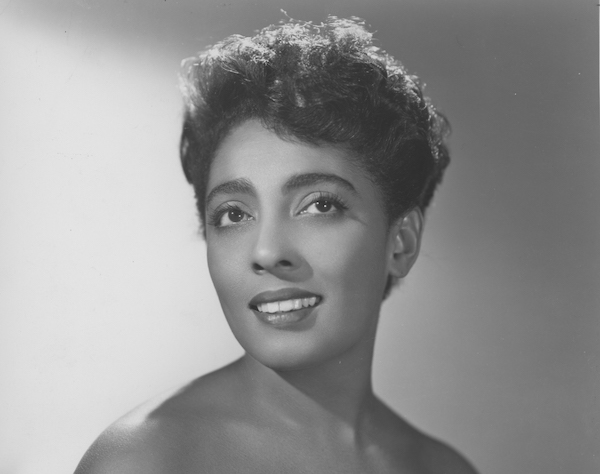Jan 13, 2026 2:09 PM
More Trump-Kennedy Center Cancellations
The fallout from the renaming of the John F. Kennedy Center for the Performing Arts to include President Donald…

Carmen McRae (1920–’94) often paid tribute to Billie Holiday, one of her key influences.
(Photo: DownBeat Archives/James J. Kriegsmann)Carmen McRae’s chemistry with a lyric was not dissimilar to sodium pentothal’s effects on subjects of interrogation: The truth, for better or worse, would emerge.
Like her idol, Sarah Vaughan, McRae was an accomplished pianist; her consummate musicianship allowed her the control to take liberties—wild or subtle—in articulating the emotions implied in a lyric. Her phrasing was so spot-on that the arc of her interpretations was logical, poetic and inevitable.
“You have to improvise,” McRae said in the June 1991 issue of DownBeat. “You have to have something of your own that has to do with that song.” She could uncork vocal pyrotechnics when called for, but she deployed her technique to project an emotional directness and vulnerability more reminiscent of Billie Holiday—her first influence—than the on-the-sleeve virtuosity of Vaughan and Ella Fitzgerald.
That McRae valued textual fidelity and restraint over florid expression is evident in a remark she made in the Jan. 2, 1964, DownBeat Blindfold Test. “If it gets to the point where you have to add an extra consonant or vowel at the end of a word ... you don’t even know what is being said,” she opined. “Embellishing lyrics is fine, if it’s just an extra word here or there; but when you make a whole new sentence out of two words that the lyricist put there because that was what he wanted ... well, I can’t see that, either.”
Carmen Mercedes McRae was born April 8, 1920, in Harlem, to parents who were from Costa Rica and Jamaica. She studied classical piano assiduously from the age of 8. She listened avidly to Holiday’s and Louis Armstrong’s 1930s vocal sides, won an amateur contest at the Apollo Theater as a pianist-singer and worked as a chorus girl for a summer in Atlantic City. By 1944, she had wed drummer Kenny Clarke.
After brief stints with the Benny Carter, Count Basie and Mercer Ellington big bands in the early to mid-’40s, McRae moved to Chicago, where she refined her craft in clubs. After returning to Brooklyn, she was hired at Minton’s in 1953 as an intermission singer-pianist. Later, she moved off the piano to become a “standup” singer. Her debut for the Bethlehem label earned McRae the DownBeat award for New Vocal Star of 1954. A year later, she signed with Decca, for which she made 12 albums that established her, in the eyes of fans, as co-equal to her aforementioned heroes in the singers’ pantheon.
McRae—who died on Nov. 10, 1994—would go on to record dozens more albums. Some were classics, like At The Great American Music Hall (1977), Fine And Mellow: Live At Birdland West (1988), Carmen Sings Monk (1990) and Sarah: Dedicated To You (1991). Others were, frankly, forgettable. But all embodied trumpeter Kenny Dorham’s paean in a DownBeat review of one of McRae’s mid-’60s recordings: “I find in no voice what I find when I listen to her sound—personal. Listen, listen!” DB
This story originally was published in the August 2020 issue of DownBeat. Subscribe here.

Belá Fleck during an interview with Fredrika Whitfield on CNN.
Jan 13, 2026 2:09 PM
The fallout from the renaming of the John F. Kennedy Center for the Performing Arts to include President Donald…

Peplowski first came to prominence in legacy swing bands, including the final iteration of the Benny Goodman Orchestra, before beginning a solo career in the late 1980s.
Feb 3, 2026 12:10 AM
Ken Peplowski, a clarinetist and tenor saxophonist who straddled the worlds of traditional and modern jazz, died Feb. 2…

The success of Oregon’s first album, 1971’s Music Of Another Present Era, allowed Towner to establish a solo career.
Jan 19, 2026 5:02 PM
Ralph Towner, a guitarist and composer who blended multiple genres, including jazz — and throughout them all remained…

Rico’s Anti-Microbial Instrument Swab
Jan 19, 2026 2:48 PM
With this year’s NAMM Show right around the corner, we can look forward to plenty of new and innovative instruments…

Richie Beirach was particularly renowned for his approach to chromatic harmony, which he used to improvise reharmonizations of originals and standards.
Jan 27, 2026 11:19 AM
Richie Beirach, a pianist and composer who channeled a knowledge of modern classical music into his jazz practice,…